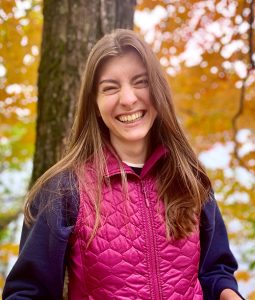Gabriella (Ella) Gurney – Addressing training inconsistencies with Maine’s coastal fishermen
 Ella is a Masters student in the Department of Communication & Journalism with a Concentration in Conservation Science
Ella is a Masters student in the Department of Communication & Journalism with a Concentration in Conservation Science
What problem/s are you working to solve?
I’m working with Maine Sea Grant on addressing training inconsistencies with Maine’s coastal fishermen. Coastal fisheries are a huge part of Maine’s character and economy, and the challenges fishermen are facing are changing as we experience the effects of a warming climate and warming oceans. They need new training and new ideas to adapt to the changes—that’s where my work with comes in.
What progress are you making toward solutions?
I’m working on compiling survey and interview feedback from over a hundred fishermen, industry representatives, and educators to identify what Maine’s fishermen need and if training programs to meet those needs exist or need to be created. In my own thesis work, I’m looking at the potential of expanded aquaculture in Maine and how that could provide a more sustainable way to grow kelp, shellfish, and even finfish without fishing in the oceans.
How could your findings contribute to a sustainable future in Maine and beyond?
Maine’s coastal waters are some of the fastest warming waters on the planet, and most of the planet’s wild caught fisheries are at capacity or overfished. Clearly, how we’ve been fishing historically is going to need to change. By speaking with fishermen and other coastal resource users, we can identify the challenges they see and directly address their needs, while also adapting current techniques to be better for people and the planet.
Why did you get involved with this internship project?
My thesis work is focused on perceptions of aquaculture in Maine, so I have an interest in Maine’s coastal resource use and how people in Maine and beyond are adapting to warming waters and a changing planet. Working on this internship with Maine Sea Grant seemed like a natural extension of my research and interests.
What do you find rewarding about collaborating with stakeholders? Most challenging?
The most rewarding things are making face-to-face connections and feeling like you’re hearing the “real deal” from people about what they want and what they need. So much of science is disconnected from the people it’s aiming to serve, and by collaborating with stakeholders, stronger bonds are made, which allows for a deeper impact.
The most challenging part is scheduling! Being a graduate student is really busy, and most stakeholders wear a lot of hats—they’re busy people with busy lives.
Where do you hope to be in five years?
Ideally, writing for National Geographic or reporting for NPR from somewhere in the field—I’ve lived in Kenya, China, and Costa Rica, to name a few, and I want to travel the world and see everything while sharing what some of the amazing people out there are doing. One day I’d like to go to the research station in Antarctica.
What’s your ultimate Maine experience?
Sitting on my back porch in the summer with a really good book and an iced coffee, surrounded by mine and my fiancé’s plants. There are a ton of really cool adventures to be had in Maine but at the end of the day, life moves really fast, and Maine is an amazing place to take things in slowly.
